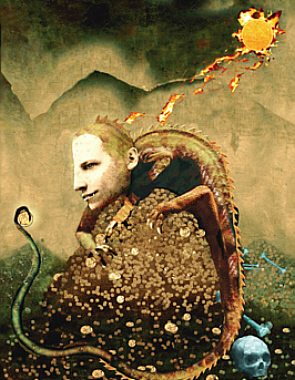What is a false dilemma?
"A false dilemma arises when we allow ourselves to be convinced that we have to choose between two and only two mutually exclusive options, when that is untrue. Generally, when this rhetorical strategy is used, one of the options is unacceptable and repulsive, while the other is the one the manipulator wants us to choose. Whoever succumbs to this trap has thus made a choice that is forced, and as such, of little value. . . . Here are a few examples of common false dilemmas:(Normand Baillargeon, A Short Course in Intellectual Self-Defense. Seven Stories Press, 2008)
• Either medicine can explain how Ms. X was cured, or it is a miracle. Medicine can't explain how she was cured. Therefore it is a miracle.
• If we don't reduce public spending, our economy will collapse.
• America: Love it or leave it.
• The universe could not have been created from nothing, so it must have been created by an intelligent life force.”
It seems easy enough to spot false dilemmas and yet, they seem to dominate the discussions about some of the most important issues we require solutions for. Have a look:
Example 1
‘If we want to reduce the use of fossil fuels for a better environment, we will lose thousands of jobs in the energy-sector. So – which do we choose: preventing unemployment or fighting climate change?’
Example 2
‘The government has two kinds of policy at its disposal to correct market failures: fiscal policy and monetary policy – not using these policies means letting the free market dictate economic conditions.’
Example 3
‘If we don’t maintain our military forces and curtail individual freedoms, terrorists will have free reign and come to destroy our beloved country.’
Example 4
‘We’ve created a society with an abundance of choices and so freedom to choose. Producing so many varieties of the same product places pressure on the environment, but reducing it would mean to give up the freedom we’ve gained.’
Do you start seeing to what extent false dilemma’s – the ‘either/or’ presentation of options – is thoroughly ingrained in media, in politics, in every day life discussions?
On the one hand false dilemmas are used to manipulate those presented with the false dilemma to choose the option that the presenter of the dilemma wishes – but on the other hand – it also encourages stagnation and paralysis. Because what happens, is: you have groups who have an interest within the one option, or who support the one option – and you have groups who have an interest within the second option, or who support the second option. And now there is a back-and-forth quibbling, to put it plainly, about which option to choose, about which group ‘loses’ and which group ‘wins’. Of course, no one wants to lose, or be the one to sacrifice their interests for the other group’s or the other goal – so everyone is fighting, but in the meantime, you maintain the status quo, because there is no movement, there is no common solution – there is just a debate, a discussion, an argument, when what is really needed is direction and action.
We tend to so blindly accept information the way it is presented to us – without critically thinking for ourselves and seeing if there are no alternatives. No, instead we immediately position ourselves on one or the other side of the dilemma and feel good about ourselves for ‘taking in a position’. But what does it matter to take in a position, if that position is not going to lead to a solution, but simply perpetuates a back-and-forth dynamic that can only lead to losing? Either ‘our group’ wins over the other, then the others lose out, or the other group wins and then ‘our group’ loses out – or no solution is reached and everyone keeps quibbling, then everyone loses out, because nothing gets directed – or both groups go into a ‘compromise’ and don’t really take on either issue, but just do ‘ a little bit’ on both fronts to please everyone – which seems like a ‘win-win’ solution – but it actually isn’t – because everyone is compromising.
The first thing to do is to take a step back and allow yourself to see the bigger picture. Because – what is presented with a false dilemma? You’re presented with a zoomed-in picture that shows two doors, two options. Now, instead of trying to break your brains over figuring out which of the doors represents the lesser of two evils – take a step back – zoom out the picture and suddenly more becomes visible within the frame – there might be a third door that had not been mentioned or there might be a pathway going around the wall that the doors are in, making every door entirely irrelevant.
In my next post, I’ll go over each of the examples and show how the Living Income proposal steps outside these false dilemmas and offers real win-win solutions.



